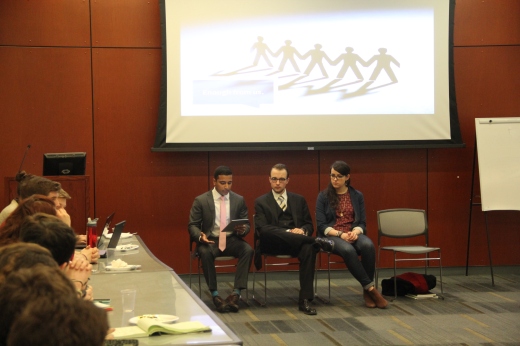By Cailin McKenna

Students from theater groups, USG, publications and RHA attended Center Stage to talk about free speech on campus. Casey Chun/The Fordham Ram
Last month, USG announced the introduction of a series called Center Stage, designed to echo the concerns and opinions of students while providing the perspective of the administration.
USG hosted the first installment of the “Center Stage” series in the hopes of promoting an environment of student-driven change on issues of free speech and expression at Fordham. “We were hoping for an open, candid discussion,” said Nevin Kulangara, GSB ’15, executive president of USG. “We are in charge of the articulation of student needs but we can’t do that behind closed doors and assume we know why the students want.”
Members of several theatre groups, RHA, USG and publications, gathered to talk about issues facing their organizations on the evening of Monday, Feb. 23 in Campbell Commons. They expressed concern over issues on campus-wide free speech, such as posting flyers without prior approval and the creation of more community board and free posting zones around campus. “I thought there would be more concern with certain issues, and there wasn’t,” Kulangara said. “And there were concerns with certain issues and policies that I wasn’t aware of.”
In the past, the Maroon Square Report (2009) and the Report on Speech and Expression (2013) were published to combat issues of free speech on campus. The original Maroon Square Report helped establish the current policy, but students at the forum discussed the effectiveness of a designated free speech location on campus.
In 2013, the USG Commission on Speech and Expression and the Dean of Students met to negotiate issues of free speech around campus. The comprise was met within a reasonable amount of time before the policy changed. The policy in place now must place a request with the Dean of Students, meet with the dean and then once approved they can hold their demonstration.
However, students had many concerns that were not addressed in these reports. Without these student forums, USG wouldn’t be aware of the real issues clubs have with school policies and processes. “Students were really concerned with other issues,” Kulangara said. “If we didn’t have this we would have gone in the wrong direction.”
Several theater groups, such as Fordham Experimental Theater (FET) and Theatrical Outreach Program (TOP) attended the event to voice similar concerns about the arduous show approval process.
Last spring, a performance of the The Vagina Monologues by Women’s Empowerment was contested by administration. Students fought for several months, and ultimately was able to perform. This event further exposed the the difficult nature of the show approval process.
Before a show can be performed, groups must submit a script to the administration. Once approved, they must buy the rights to the show, which can often hinder or delay the performance. Fordham’s location just ten miles from Broadway poses some major obstacles to obtaining the rights to shows.
Although The Vagina Monologues was eventually approved and performed, some shows never make it to the Collins’ or the Blackbox’s stage.
This was the case this past summer, when it took the administration three months to approve FET’s show Rocky Horror Picture Show. When the show was finally approved, the rights had already been purchased and FET’s request was blocked out. “It’s a huge ‘what if,’’ said AJ Golio, FCRH ’16, president of FET. “We don’t know if it had been approved in a timely matter if we would have been able to get them.”
Golio echoed the sentiments of many other club leaders who were present at the event, and is optimistic about the future of the approval process for shows. “We are lucky that very recently we were able to sit down with Dean Nolan to talk about the show approval process,” he said. “This semester it has been a lot better and events have been approved within 10 days as the policy says.”
In the coming weeks, Golio will meet with Dean Nolan, assistant dean for students, again in the hopes of further smoothing the process for show approval. USG also plans to sit down with Golio and other leaders of theater groups to simplify the show approval process.
The Center Stage series will remain student-run and an open space to facilitate student discussion about student ideas and concerns. “We want administrators to have a minimal role in this,” said Kulangara. “We want everyone’s responses to be as candid as possible.”
Kulangara hopes future events in the series will encourage a more diverse representation of campus clubs and students to come out and voice their opinions. The next Center Stage event will be held in mid-March on the topic of sustainability.
